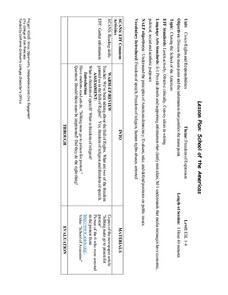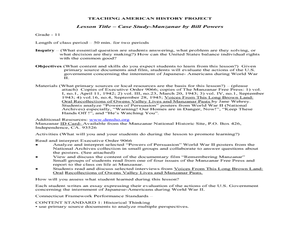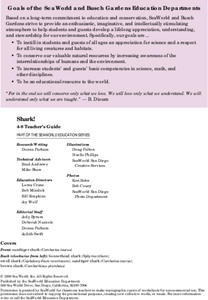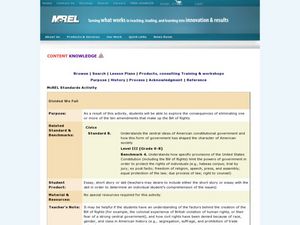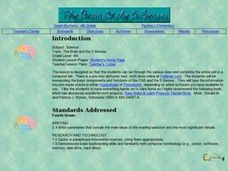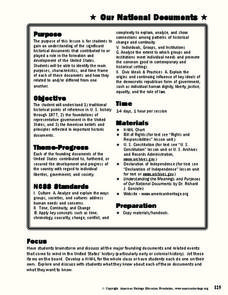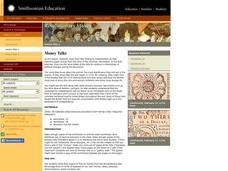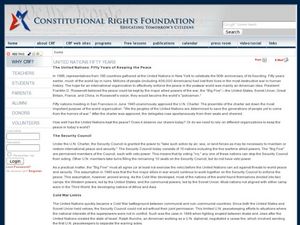Curated OER
Judges in the Classroom
Students study the history of the Bill of Rights and discuss the first ten amendments. The class is put into groups and each group is responsible for knowing 5 statements from the history of the Bill of Rights. Then the class plays a...
Curated OER
School Of The Americas
Learners investigate the concept of The Bill Of Rights in order to review the freedom of speech and religion. They read an article in order to establish a context. The lesson continues as students research some cases of free speech and...
Curated OER
The Glorious Revolution, the American Revolution, and the French Revolution
Pupils relate the Glorious Revolution, the American Revolution, and the French Revolution through web based research and scenarios.
Curated OER
Case Study: Manzanar
Eleventh graders investigate Japanese-American internment. In this World War II lesson, 11th graders conduct research from the Manzanar National Historic Sites and then write essays based on their findings.
SeaWorld
Shark!
Here is an impressive collection of lessons on sharks. In them, pupils undertake a serious study of sharks, their habitats, their social structure, and how humans adversely impact their existence. These lessons effectively integrate...
Curated OER
Divided We Fall
Middle schoolers investigate the consequences of eliminating one or more of the amendments to the Bill of Rights.
Library of Virginia
An Overview of American Slavery
The final lesson in a unit study of American slavery asks young historians to synthesize what they have learned about how slavery in America changed over time. Revisiting the many documents they have examined, they consider the economic,...
Curated OER
A Time for Justice
Middle schoolers explain the protections and privileges of individuals and groups in the United States.
Curated OER
US Patriot Act: Security vs. Privacy
Students use readings, worksheets and discussion to explore the ramifications of the US Patriot Act which was passed by Congress shortly after September 11th. They review Constitutional Amendments and consider how they relate to the...
Curated OER
A Civic Duty to Protest
Students examine the concept of religious freedom by evaluating Hong Kong's security laws. In pairs students investigate the levels of religous freedom allowed in various countries around the world and present this information to the class.
Curated OER
Revolutionary Money
Examine paper money from the American revolution! Historians study the paper bills and discuss the history of money. How has money changed over the times? Activities are included.
Curated OER
U.S. History: Our Constitutional Amendments
Eighth graders conduct Internet research about Constitutional Amendments and present oral reports on their findings. Their reports also include visual representations depicting their chosen amendment's focal point. Students discuss the...
Curated OER
VS.6b
Sixth graders explore, analyze and identify the ideas of George Mason and Thomas Jefferson as expressed in the Virginia Declaration of Rights and the Virginia Statue for Religious Freedom. They list and declare the responses stated in...
Curated OER
Fairness
Pupils explore how a bill becomes law. They discuss the concept of human rights and fairness. In groups, students research a topic of interest. Given a problem, pupils work together to solve it fairly. They prepare and give an oral...
Curated OER
In His Own Words: James Madison On the Problem of Faction
Students are introduced to the writings of James Madison and explain why he is often called "The Father of the Constitution". Using primary source documents, they examine his view of the Bill of Rights and what he meant by faction. In...
School Improvement in Maryland
Political Systems: Advantages and Disadvantages
Every political system has advantages and disadvantages. To gain an understanding of these differences, groups investigate the political system of another country—oligarchy, monarchy, dictatorship, parliamentary—and prepare a...
Curated OER
Our National Documents
Students consider the significance of selected American documents. In this civics lesson, students analyze excerpts of the Declaration of Independence, the U.S. Constitution, and the Bill of Rights.
Curated OER
The Preamble to the U. S. Constitution
Fifth graders explain the purpose of the government by examining the Preamble to the Constitution. They identify ways in which the government is preserving those rights today. They discover one of the fundamental principles of...
Curated OER
Money Talks
Students move from fact finding to interpretation as they examine paper money from the time of the American Revolution. In the final exercise, they use the issue dates of the bills to construct a chronology of political changes during...
Curated OER
A Woman's Crusade: Dorothea Dix
High schoolers examine the life and reform efforts of Dorothea Dix on behalf of people with disabilities. They also examine the role of women in the 1840s and 1850s. They discover different sources of examples of citizen's rights.
Curated OER
The United Nations: Fifty Years of Keeping the Peace
High schoolers examine the work of the United Nations. In this United Nations lesson, students listen to their instructor present a lecture regarding the history of the United Nations. High schoolers respond to discussion questions...
Curated OER
A World At Peace
Young scholars view a film segment and identify examples of world conflict. They examine why groups fight for control of land or natural resources. They discover ways in which conflict can be avoided.
Curated OER
The U.S. Trade Embargo on Cuba
Students examine perspectives for and against the U.S. trade embargo on Cuba, develop a position on the embargo and articulate viewpoints in a public forum.
Heritage Foundation
Substantive Amendments: Amendments I and II
The First and Second Amendments remain some of the most famous, even to this day. Learners read about several clauses from the US Constitution through a variety of captivating activities including before and after reading, group work,...



